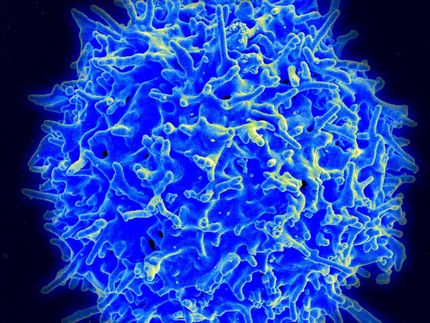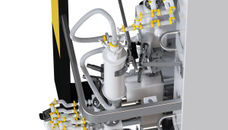Nanoparticles carry cancer-killing drugs into tumor cells
University of Michigan scientists have created the nanotechnology equivalent of a Trojan horse to smuggle a powerful chemotherapeutic drug inside tumor cells - increasing the drug's cancer-killing activity and reducing its toxic side effects. Previous studies in cell cultures have suggested that attaching anticancer drugs to nanoparticles for targeted delivery to tumor cells could increase the therapeutic response. Now, U-M scientists have shown that this nanotechnology-based treatment is effective in living animals.
The drug delivery vehicle used by U-M scientists is a manmade polymer molecule called a dendrimer. Less than five nanometers in diameter, these dendrimers are small enough to slip through tiny openings in cell membranes. Dendrimers have a tree-like structure with many branches where scientists can attach a variety of molecules, including drugs. In experiments reported in Cancer Research, U-M scientists attached methotrexate, a powerful anticancer drug, to branches of the dendrimer. On other branches, they attached fluorescent imaging agents and their secret ingredient - a vitamin called folic acid.
Folic acid, or folate, is an important vitamin required for the healthy functioning of all cells. But cancer cells, in particular, seem to need more than average amounts. To soak up as much folate as possible, some cancer cells display more docking sites called folate receptors on their cell membranes. By taking advantage of a cancer cell's appetite for folate, U-M scientists are able to prevent the cells from developing resistance to chemotherapeutic drugs.
"It's like a Trojan horse," James R. Baker Jr., M.D., the Ruth Dow Doan Professor of Biologic Nanotechnology at the University of Michigan, explains. "Folate molecules on the nanoparticle bind to receptors on tumor cell membranes and the cell immediately internalizes it, because it thinks it's getting the vitamin it needs. But while it's bringing folate across the cell membrane, the cell also draws in the methotrexate that will poison it."
When tested in laboratory mice that had received injections of human epithelial cancer cells, the nanoparticle-based therapy using folic acid and methotrexate was 10 times more effective at delaying tumor growth than the drug given alone. Nanoparticle treatment also proved to be far less toxic to mice in the study than the anticancer drug alone.
Before they began to study the effects of targeted nanoparticle therapy on cancer, U-M scientists injected dendrimers with fluorescent tags into the bloodstream of laboratory mice to determine where they would be retained in the body. The results showed that the kidneys quickly filtered free nanoparticles from blood and eliminated them in urine. The researchers found no evidence that nanoparticles were able to leave the bloodstream and enter the brain. The nanoparticles did not appear to generate an immune response in mice in the study.
In future research, scientists at the Michigan Nanotechnology Institute will determine the maximum therapeutic dose, in research animals, of targeted nanotherapy with methotrexate, and complete other preliminary studies in preparation for the first human clinical trial, which Baker says is scheduled to begin within two years.
The research was funded by the National Cancer Institute. The University of Michigan has filed a patent application on targeted nanoparticle technology. A licensing agreement is currently being negotiated with Avidimer Therapeutics, a biopharmaceutical company in Ann Arbor, Mich. Baker holds a significant financial interest in the company.
Original publication: Cancer Research 2005. 65 (12).



























































